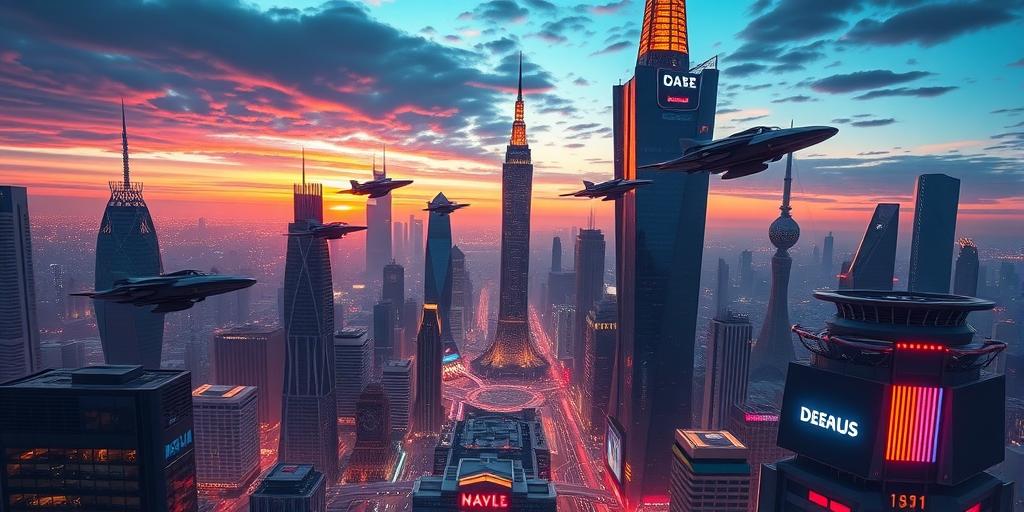Get ready to be amazed! Fasten your seatbelts, because we’re about to take a mind-bending journey into the future – the year 2050, to be exact. Emerging technologies are poised to revolutionize our world in ways we can barely imagine, transforming everything from how we work and play to how we interact with each other and the environment. Prepare to be blown away by the possibilities and challenges that lie ahead! This article will provide insights into the predicted landscape of 2050, exploring the impact of groundbreaking technologies on various aspects of our lives.
Transportation: Flying Cars and Beyond
Buckle up for a ride unlike anything you’ve ever experienced! Imagine zipping through the air in your personal flying vehicle, dodging traffic jams that are now a relic of the past. The future of transportation is taking flight, literally. Autonomous vehicles will become commonplace, seamlessly navigating our cities and highways, improving safety and efficiency. High-speed rail systems could connect continents, drastically reducing travel times. However, integration challenges, such as air traffic control for autonomous flying vehicles and the environmental impact of widespread air travel, will need to be addressed.
The Rise of Hyperloops and Autonomous Vehicles
The emergence of hyperloops promises to revolutionize long-distance travel with speeds exceeding those of conventional high-speed trains. These high-speed transit systems, involving pods that travel through near-vacuum tubes, could cut travel time between major cities drastically. The widespread adoption of autonomous vehicles will improve traffic flow and safety, while electric vehicles could potentially resolve issues surrounding air quality and climate change.
Healthcare: The Personalized Medicine Revolution
Prepare for a healthcare system that’s smarter, more personalized, and more preventative. Advanced diagnostics, powered by artificial intelligence and nanotechnology, will lead to earlier and more precise disease detection. Personalized medicine will become the norm, tailoring treatments and prevention strategies to each individual’s unique genetic makeup and lifestyle. Genetic engineering might even allow us to edit out disease-causing genes before they ever manifest.
Nanobots and AI Diagnostics
The application of nanobots in medicine holds immense potential. Imagine tiny robots circulating within the bloodstream, delivering drugs directly to cancerous tumors, repairing damaged tissues, or even cleaning arteries to prevent heart attacks. AI-powered diagnostics will analyze medical images and patient data with unprecedented accuracy and speed, resulting in earlier disease detection and improved treatment outcomes. However, ethical concerns regarding genetic engineering and the equitable access to these advanced technologies need careful consideration.
The Workplace: Automation and the Future of Jobs
Get ready for a workplace unlike anything we’ve seen before. Automation will transform numerous industries, affecting job markets significantly. While many routine tasks will be automated, new roles focused on technology development, maintenance, and oversight will be created. The demand for highly skilled workers in fields like artificial intelligence, data science, and cybersecurity will skyrocket. We might see a rise in remote work and a blurring of the lines between work and personal life.
The Rise of the Gig Economy and Remote Work
The gig economy is already prevalent and will continue to expand, offering greater flexibility but also raising concerns about job security and worker’s rights. Remote work will become increasingly commonplace, empowering individuals to work from anywhere in the world. However, adapting to these changing work dynamics will necessitate enhanced skills development and educational opportunities to prepare the workforce for the jobs of the future. Preparing the workforce of tomorrow needs to begin today, and the need to adapt to the changes that AI and automation brings will be essential.
Environmental Sustainability: Green Tech and Climate Change
Our planet’s future is in our hands, and innovative green technologies offer a lifeline. Renewable energy sources, such as solar, wind, and geothermal, will become increasingly dominant, reducing our reliance on fossil fuels. Smart grids will optimize energy distribution, minimizing waste and maximizing efficiency. Sustainable agriculture practices, coupled with advancements in food technology, will help feed a growing global population without further harming the environment.
Addressing Climate Change with Innovative Solutions
Innovative approaches are required to address the threat of climate change and its consequences. Carbon capture technologies will play a crucial role in removing carbon dioxide from the atmosphere. Developments in sustainable building materials and green urban planning will help create environmentally friendly cities and infrastructures. However, it’s crucial to address the global challenges of climate change through international cooperation and commitment.
The year 2050 holds incredible potential, but it’s vital to address the challenges that arise along the way. Embrace the future, and let’s work together to make this transformative era a success for all!
Want to learn more about the future of technology? Subscribe to our newsletter for more insightful articles and updates!




